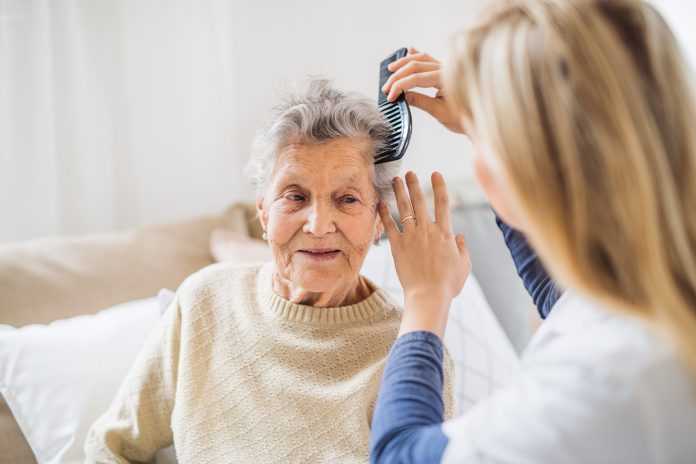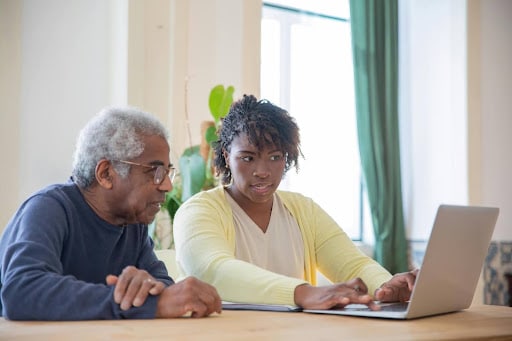Aging brings about various physiological changes, and hair is no exception. Hair often loses its inherent moisture as people age, leading to a drier and more brittle texture, making it prone to breakage. In addition, the hair growth rate diminishes, and the hair strands become finer. These age-related changes call for a revised approach to hair care, one that caters to the unique needs of seniors’ hair.
Unfortunately, mainstream hair care discussions often overlook the senior demographic. Hence, this article highlights the critical dos and don’ts of hair care tailored for seniors.
The Dos
-
Ensure Adequate Hydration
Maintaining sufficient hydration in the hair stands as a significant challenge faced by seniors. Given the diminishing moisture in aging hair, restoring this lost hydration is vital. The solution lies in using gentle, hydrating hair products like shampoos, conditioners, and hair oils specifically formulated for elderly hair. Look for products that incorporate natural ingredients such as aloe vera, jojoba oil, or chamomile extract. These ingredients deliver intensive hydration and calm the scalp, staving off irritation and dryness.
-
Use Mild Shampoo
As highlighted earlier, hair care for seniors entails the use of gentle products. So, when selecting hair care products for seniors, steer clear of harmful chemicals in shampoo. Ingredients like sulfates and parabens can strip away the hair’s inherent moisture, disrupt the scalp’s pH balance, and even prompt irritation, leading to increased dryness, brittleness, and discomfort. Furthermore, these intense chemicals can accumulate over time, potentially resulting in severe scalp conditions and further hair damage. Instead, choose mild shampoos with natural ingredients that nourish the hair while maintaining its inherent moisture.
-
Promote Scalp Circulation
The health of the scalp directly influences hair health. Scalp massages are an effective way to boost blood circulation to the hair follicles, improving hair health and potentially promoting growth. This increased blood flow not only helps stimulate hair follicles for potential growth but also assists in delivering essential nutrients that contribute to the development of healthy hair.
Therefore, it’s advisable to incorporate gentle scalp massages into the hair care routine. This practice not only enhances hair health but also provides a calming effect, reducing stress and inducing relaxation—an added advantage indeed!
-
Ensure A Balanced Diet
True to the saying, “You are what you eat,” a nutrient-rich diet can significantly impact an elderly person’s hair health. Consuming foods rich in proteins, vitamins like B, C, and E, minerals such as zinc and iron, and Omega-3 fatty acids can support hair health. These nutrients aid in bolstering the hair’s structural integrity, promote hair growth and prevent hair loss. Foods packed with these beneficial elements, such as fish, eggs, leafy greens, nuts, and seeds, should become regular parts of a senior’s diet.
By understanding the specific needs of senior hair and choosing appropriate hair care methods, you can help maintain their hair health, ensuring it remains strong and vibrant. But, while adopting the right hair care practices is important, avoiding harmful practices is equally critical.
The Don’ts
-
Avoid Overwashing
While maintaining cleanliness is paramount, overwashing can be harmful to hair health. Excessive shampooing can deprive hair of its intrinsic oils, resulting in dryness and fragility. This dryness can, in turn, make hair susceptible to breakage and split ends, compromising the overall hair condition.
Overwashing can also disrupt the scalp’s natural balance, potentially causing scalp irritations. Based on the oiliness of the hair and the individual’s daily activities, shampooing should ideally be limited to two or three times per week to ensure cleanliness without compromising the hair’s protective oils.
-
Refrain From Using Heat Styling Tools
Heat styling tools can significantly damage the hair, particularly for seniors with already fragile strands. The high temperatures these tools emit can deprive hair of moisture, leading to dryness and brittleness. Extended exposure to heat can also alter the hair’s structure, leading to irreversible damage.
Additionally, heat styling can render hair dull and lifeless by stripping away the hair’s natural shine. Therefore, heat-based styling tools such as curlers, straighteners, and high-temperature hair dryers are best avoided. Instead, opt for natural drying methods or, if necessary, use a hairdryer on the lowest heat setting.
-
Don’t Neglect Regular Trims
Regular trims can indeed enhance hair health, although it might seem counterintuitive, especially for those wanting to maintain length. Trimming helps remove split ends and prevent further damage. Left unattended, split ends can ascend the hair shaft, causing even more damage. Regular trims ensure the removal of these damaged ends, thereby preserving the integrity of the remaining hair. Additionally, a well-maintained hairstyle can contribute positively to an elderly person’s self-esteem and general outlook.
Steering clear of practices that can be detrimental to hair health is just as important as adhering to beneficial ones. A harmonious blend of both can lead to better hair health for seniors.
The Takeaway
Caring for seniors’ hair requires striking a delicate balance. It involves nourishing and safeguarding the hair while avoiding practices that may inflict further damage. By following these dos and don’ts, you can maintain your senior loved ones’ hair health, thereby enhancing their self-image and overall well-being. After all, while aging is a natural process, maintaining one’s appearance and feeling good about oneself need not be compromised. Good hair care undoubtedly plays a vital role in achieving this.























